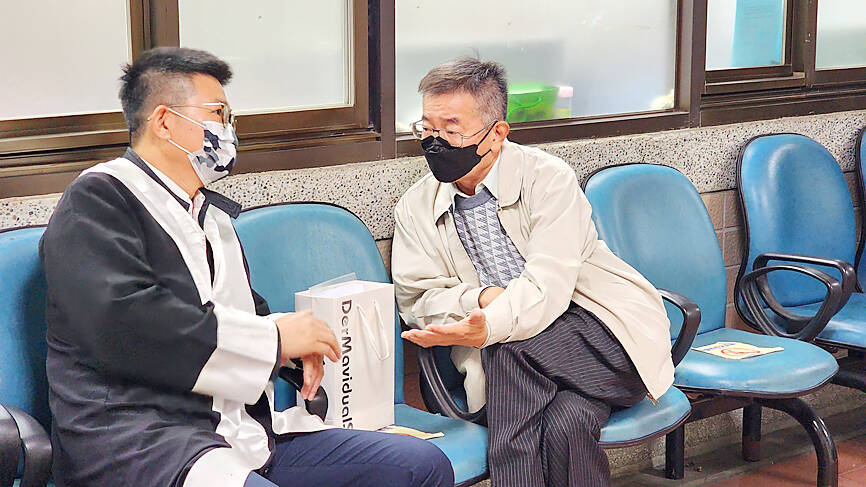Former lawmaker Lo Chih-ming (羅志明) and retired rear admiral Hsia Fu-hsiang (夏復翔) have been indicted on espionage charges for allegedly developing a spy network for China and inviting military retirees to meet Chinese government officials.
Kaohsiung prosecutors announced the indictment yesterday, citing evidence and witness testimony that Lo — a former legislator for the Taiwan Solidarity Union — and retired naval rear admiral Hsia began their efforts in 2013 after being recruited by the Chinese military and United Front Work Department.
Lo and Hsia were charged for contravening the National Security Act (國家安全法) on evidence of inviting and accompanying several retired military officers, 48 ranked as generals or major generals, on 13 trips to China from 2013 to 2019, Kaohsiung deputy head prosecutor Hsu Hung-ju (徐弘儒) said.

Photo: CNA
Many were lured by financial incentives and passed confidential material to China, among other espionage activities, while Lo and Hsia built spy networks, Hsu said.
Lo and Hsia allegedly led the trips to events organized by Beijing, including a gathering for alumni of the Whampoa Military Academy, the Zhuhai International Airshow and golf competitions.
The trips were paid for by Beijing, and Taiwanese military personnel were treated like VIPs while attending banquets and conferences, Hsu said.
Lo befriended Hsia while playing golf together, and through Lo’s business connections, he became acquainted with Li Ying (李鷹), a Chinese biotechnology firm chairman who had extensive ties with the Chinese military, investigators said.
As deputy head of the navy’s Political Warfare Section, Hsia attended events in China and was introduced to former Chinese United Front Work Department section heads Hao Yifong (郝一峰) and Fang Xinsheng (方新生), Hsu said.
Through these connections, Lo and Hsia were recruited and paid to bring retired generals and other officers to junket trips to China, where they were likely influenced by Beijing officials and convinced to conduct espionage, Hsu said.
Separately, Kaohsiung City Councilor Chang Po-yang (張博洋) of the Taiwan Statebuilding Party accused the Mainland Affairs Council (MAC) and other ministries of neglecting to draft laws to prevent elected officials from attending political meetings in an enemy state.
Chang said he was referring to Chinese Nationalist Party (KMT) politicians visiting China to attend Whampoa Military Academy anniversary functions, along with other junket trips to China.
Most recently, KMT Taoyuan City Council Speaker Chiu Yi-sheng (邱奕勝) led a 24-member delegation of city councilors and their spouses to Shanghai, and met United Front Work Office Shanghai chairman Chen Tong (陳通) on Tuesday, Chang said.
There was also a trip to Beijing last month led by Kaohsiung borough warden Liu Chi-fang (劉啟芳), also of the KMT, in which a 52-member group comprised of other wardens and community organization directors attended a conference chaired by China’s top Taiwan Affairs Office official, Song Tao (宋濤), Chang said.
He criticized MAC for saying that Taiwan has no law banning officials from such engagement with China, saying that lack of such a law allowed officials to meet with officials of an enemy state.

Taiwan has received more than US$70 million in royalties as of the end of last year from developing the F-16V jet as countries worldwide purchase or upgrade to this popular model, government and military officials said on Saturday. Taiwan funded the development of the F-16V jet and ended up the sole investor as other countries withdrew from the program. Now the F-16V is increasingly popular and countries must pay Taiwan a percentage in royalties when they purchase new F-16V aircraft or upgrade older F-16 models. The next five years are expected to be the peak for these royalties, with Taiwan potentially earning

POSITIVE DEVELOPMENT: Japan and the US are expected to hold in-depth discussions on Taiwan-related issues during the meeting next month, Japanese sources said The holding of a Japan-US leaders’ meeting ahead of US President Donald Trump’s visit to China is positive news for Taiwan, former Japan-Taiwan Exchange Association representative Hiroyasu Izumi said yesterday. After the Liberal Democratic Party’s landslide victory in Japan’s House of Representatives election, Japanese Prime Minister Sanae Takaichi is scheduled to visit the US next month, where she is to meet with Trump ahead of the US president’s planned visit to China from March 31 to April 2 for a meeting with Chinese President Xi Jinping (習近平). Japan and the US are expected to hold in-depth discussions on Taiwan-related issues during the

‘LIKE-MINDED PARTNER’: Tako van Popta said it would be inappropriate to delay signing the deal with Taiwan because of China, adding he would promote the issue Canadian senators have stressed Taiwan’s importance for international trade and expressed enthusiasm for ensuring the Taiwan-Canada trade cooperation framework agreement is implemented this year. Representative to Canada Harry Tseng (曾厚仁) in an interview with the Central News Agency (CNA) said he was increasingly uneasy about Ottawa’s delays in signing the agreement, especially as Ottawa has warmed toward Beijing. There are “no negotiations left. Not only [is it] initialed, we have three versions of the text ready: English, French and Mandarin,” Tseng said. “That tells you how close we are to the final signature.” Tseng said that he hoped Canadian Prime Minister Mark Carney

STAY IN YOUR LANE: As the US and Israel attack Iran, the ministry has warned China not to overstep by including Taiwanese citizens in its evacuation orders The Ministry of Foreign Affairs (MOFA) yesterday rebuked a statement by China’s embassy in Israel that it would evacuate Taiwanese holders of Chinese travel documents from Israel amid the latter’s escalating conflict with Iran. Tensions have risen across the Middle East in the wake of US and Israeli airstrikes on Iran beginning Saturday. China subsequently issued an evacuation notice for its citizens. In a news release, the Chinese embassy in Israel said holders of “Taiwan compatriot permits (台胞證)” issued to Taiwanese nationals by Chinese authorities for travel to China — could register for evacuation to Egypt. In Taipei, the ministry yesterday said Taiwan